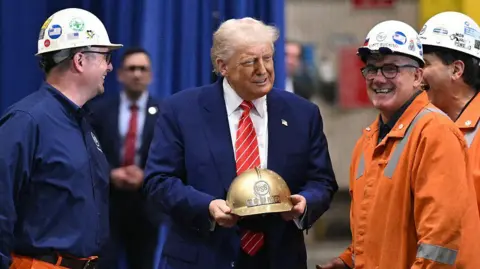In a pivotal move that has sparked considerable debate, Japanese firm Nippon Steel has successfully completed its takeover of US Steel, a significant but smaller American steel producer. This acquisition was finalized following extensive negotiations and some concessions made by Nippon to assuage concerns raised by the US government regarding foreign control over a key industry. The deal, valued at $14.9 billion, represents a substantial step for Nippon, positioning it as one of the foremost players in the global steel market and a noteworthy entity within the American economic landscape.
Originally unveiled in 2023, the takeover was perceived as a potential lifeline for US Steel, a company with a rich history spanning over 124 years, yet plagued by operational challenges and financial instability. However, the acquisition faced scrutiny during the late stages of a contentious presidential election, wherein prominent political figures, including then-President Donald Trump and his Democratic counterparts, expressed deep reservations about the implications of allowing a foreign company to acquire a major US steel manufacturer. Their opposition intertwined with national security concerns heightened the scrutiny surrounding the deal.
Despite the initial resistance, Trump’s administration took a surprising turn. After Nippon Steel pledged to implement safeguards addressing national security worries, the President ultimately approved the acquisition. This marked a significant reversal, allowing the Japanese firm to move forward with its purchase under an executive order issued shortly after the announcement of the adjustments made by Nippon.
The specifics of the deal outline that Nippon agreed to acquire shares at $55 apiece and absorb US Steel’s existing debt, solidifying the total investment at $14.9 billion. Furthermore, Nippon committed to injecting $11 billion into US Steel by 2028, earmarking funds for infrastructure improvements, including the construction of a new manufacturing facility expected to be operational after 2028. As part of their agreement with the US government, Nippon also granted a “golden share” to Washington, thereby allowing it some oversight over critical corporate decisions. This includes regulations concerning any potential job relocations outside the US, as well as the authority to influence significant operational changes within US Steel.
Additionally, Nippon made pivotal commitments to ensure the viability and longevity of US Steel’s operations in the United States. They vowed to maintain the company’s headquarters in Pittsburgh, Pennsylvania, and ensure that essential leadership roles, notably the CEO position and a majority of board members, include American citizens. This dedication underscores Nippon’s intent to sustain the company’s American identity and operational footprint.
In a joint statement, both Nippon Steel and US Steel emphasized the importance of this partnership, asserting that it would ensure the enduring legacy of the US Steel brand while promising the creation and protection of over 100,000 jobs in the process. However, this acquisition has not been without controversy. Trump’s emphasis on protecting the domestic steel industry includes substantial tariff measures, including a 50% increase on imports to support American manufacturers. The President’s change of heart regarding the Nippon takeover was influenced heavily by local leaders’ outcry, who warned that US Steel could face job cuts if new investment did not materialize.
Union leaders representing US Steelworkers voiced strong opposition to the acquisition, fearing job security and industry stability under foreign control. During the dwindling days of the Biden administration, a blockade was placed on the acquisition, leading to legal battles between companies who accused the previous President of inappropriately politicizing a national security concern.
Ultimately, the takeover encapsulates complex themes involving international business operations, national security, and economic strategy within the US steel sector, raising questions about foreign influence and domestic labor conditions for years to come. The events surrounding this acquisition indicate not just a shift in corporate ownership but also a reflection of broader themes in US policy regarding foreign investment and industry sustainability.



